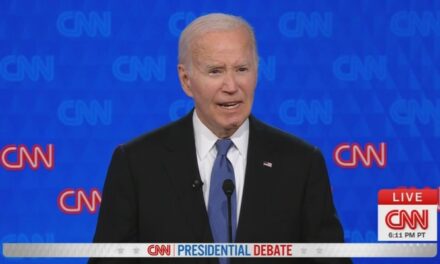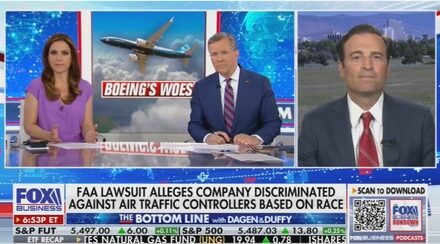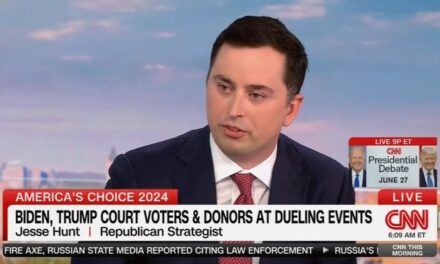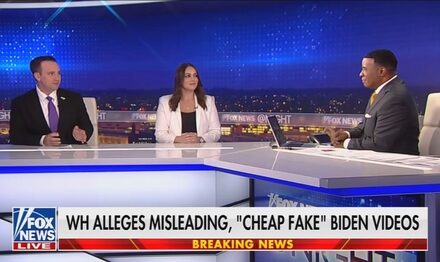We support our Publishers and Content Creators. You can view this story on their website by CLICKING HERE.
The broadcast networks of ABC, CBS, and NBC each spent a chunk of their Tuesday morning newscasts tearing at the fabric of American intuitions by stoking fear of the U.S. Supreme Court’s ruling limiting presidential immunity. Amid those reports, something interesting happened on CBS Mornings as legal correspondent Jan Crawford slammed the brakes on Democratic Party donor and CBS co-anchor Gayle King, who was trying to fear monger about presidents being above the law.
Leading into the segment, King asserted that the “landmark” ruling “redefined the power of the office of the president.” “Now, you should know there is no precedent for a decision like this because, until now, we’ve never had a former president who has faced criminal charges like Donald Trump,” she added.
As she was handing it off to Crawford to tell the rest of the story, King parroted “some people” who claim the court put president “above the law,” but the career legal expert wasn’t having it:
KING: Jan Crawford at the Supreme Court is going to help us with the first part of the question. Jan, good morning. Some people are interpreting this to mean that the president is above the law. What can you tell us?
CRAWFORD: Not exactly, by any means. I mean this basically sends the case back to a lower court to decide which acts of former President Trump are unofficial and can still be criminally prosecuted, but that can take time. It’s very hard to see how this trial will start before November’s elections.
Crawford seemingly had the ability to perceive the future because her pre-taped report began with a quote from Chief Justice Roberts’ majority opinion definitely affirming that “not everything the president does is official. The president is not above the law.” “Noting a president’s unofficial acts could be prosecuted – possibly including those made as a candidate or party leader,” she added.
Seemingly taking aim at the liberal media’s narrative that the Supreme Court was just doing the bidding of former President Trump, she followed up by report that the justices “rejected [Trump’s] sweeping claims he was absolutely immune from prosecution for his actions around January 6.”
While much of the rest of the liberal media were gushing about the dissent from far-left Justice Sonia Sotomayor (who ridiculously predicted political assassinations), Crawford countered with Roberts’ direct rebuke of the hysteria:
The 6-3 decision sharply divided the justices along ideological lies. Justice Sonia Sotomayor wrote a fiery dissent for the liberals, expressing her fear for our democracy, and saying the decision makes the president “now a king above the law.” That prompted an unusually fierce response from Roberts, accusing the dissent of “fearmongering on the basis of extreme hypotheticals.”
Crawford wasn’t the only one to push back on the fearmongering from the liberal anchors. Legal analyst Rikki Klieman rejected claims made by co-anchor Tony Dokoupil (Click “expand”):
DOKOUPIL: So, a key part of the interference allegations and I think a disturbing aspect of the Supreme Court ruling for a lot of people is that Donald Trump’s efforts to pressure his vice president not to certify the election will be an official act and therefore not prosecutable.
KLIEMAN: No, wrong. It’s the Justice Department conversations. They are definitely not prosecutable. The question of the conversations with Mike Pence to stop the certification they may be presumptively official, but I would still think Judge Chutkan will find that the government can overcome the presumption and there going forward. What’s the problem here is delay because they’re all going to be appealed.
Despite those touches of sanity, the overwhelming flavor the CBS’s tone was to turn the American people against the court. King looked to CBS anchor and liberal commentator John Dickerson and suggested “the guardrails have now come off.”
“And why do we think that? Three reasons—One, we have the testimony of his former officials who said much of our time was spent telling him you can’t do that, it’s illegal. He’s likely to think you know what, I know how to get around this,” Dickerson divined.
For her final question, King ask Dickerson to tell voters “how” to think about the ruling. Dickerson went on to bloviate about “character”:
Character means two things. One, do you care about people other than your base because your president of the whole country. And what that means is are you going to do things that are going to help the most number of people. And the second part of character means do you realize there are long term consequences for your behavior. It’s not just what’s gonna help you and what’s gonna help you in the short term but you are in a job that requires that you think about the future.
“And putting character back in focus on the job is a good thing for an election and it’s what everyone should be talking about,” he demanded.
The transcript is below. Click “expand” to read:
CBS Mornings
July 2, 2024
7:02:08 – 7:10:41 a.m. EasternGAIL KING: We’re gonna begin though with this, that landmark Supreme Court decision you’ve heard about it which redefined the power of the office of the president. Now, the court ruled that the official acts of sitting presidents are immune to criminal prosecution even after they leave office.
Now, you should know there is no precedent for a decision like this because, until now, we’ve never had a former president who has faced criminal charges like Donald Trump. So, what does this mean for Trumps legal cases and for the presidency itself? We’ll try to answer that as well as explain what the decision actually said.
Jan Crawford at the Supreme Court is going to help us with the first part of the question. Jan, good morning. Some people are interpreting this to mean that the president is above the law. What can you tell us?
JAN CRAWFORD: Not exactly, by any means. I mean this basically sends the case back to a lower court to decide which acts of former President Trump are unofficial and can still be criminally prosecuted, but that can take time. It’s very hard to see how this trial will start before November’s elections.
[Cuts to video]
In a historic decision, the Supreme Court ruled for the first time that former presidents have some immunity from prosecution. Though Chief Justice John Roberts, writing for the majority, said “not everything the president does is official. The president is not above the law.” Noting a president’s unofficial acts could be prosecuted – possibly including those made as a candidate or party leader.
DONALD TRUMP [FEBRUARY 8]: You have to give a president full and total immunity.
CRAWFORD: The court rejected former President Donald Trump’s sweeping claims he was absolutely immune from prosecution for his actions around January 6. But it said presidents must have some immunity to “execute the duties of his office fearlessly and fairly” and so “official acts” are largely shielded from prosecution.
The 6-3 decision sharply divided the justices along ideological lies. Justice Sonia Sotomayor wrote a fiery dissent for the liberals, expressing her fear for our democracy, and saying the decision makes the president “now a king above the law.” That prompted an unusually fierce response from Roberts, accusing the dissent of “fearmongering on the basis of extreme hypotheticals.”
The court emphasized the lasting significance of its decision well beyond Trump, noting concerns about opening up Pandora’s box of criminal prosecutions of former presidents. Trump hailed to the court’s ruling, writing the decision was a “big win for our constitution and democracy,” while President Biden spoke out last night siding with the dissent.
JOE BIDEN: This is a fundamentally new principle and it’s a dangerous precedent, because the power of the office will no longer be constrained by the law.
CRAWFORD: But the high court’s decision does allow Special Counsel Jack Smith to prosecute Trump for private acts and deciding what those are now falls to Judge Tonya Chutkan who is overseeing the federal election interference case.
THOMAS DUPREE (FORMER DEPUTY ASSISTANT ATTORNEY GENERAL): This is not the end of the prosecution of Donald Trump. I strongly suspect that Jack Smith will find allegations that he thinks survive and Judge Chutkan, more importantly, will find allegations that she thinks survive.
[Cuts back to live]
CRAWFORD: Now, last night, Trump’s legal team did send a letter, citing the decision, and asking the judge in his New York hush money trial to overturn his criminal conviction. That is a stretch, to say the least. It seems perhaps more of an effort to delay his sentencing which is now set for July 11th, Tony.
TONY DOKOUPIL: Jan, got it, thank you very much. For more on this, let’s go to our chief political analyst John Dickerson and CBS News legal analyst Rikki Klieman. Good morning to both of you. We’re going to talk to you, John, in a moment about the presidency and what this means but first, the legal cases that Trump is facing — what now, Rikki?
RIKKI KLIEMAN: Well, Jan just mentioned New York looking to stop the conviction, to overturn it and not be sentenced is ridiculous. So, let’s look at the January 6 case. The January 6 case is the case that went up to the Supreme Court. What is going to happen here is a matter of procedure.
It is going to get kicked back down to the district court — that’s Judge Tanya Chutkan. Judge Chutkan is going to have a hearing on every act that is in this indictment. Keep in mind this indictment is 45 pages. It has 128 paragraphs in it. And of them, 123 are acts. So, what Judge Chutkan is going to do is go one by one after they brief the issue for her and hear arguments, and she’s going to make a decision and say, well, this act is not official, this act is private. And there I will say, I think, without fear of contradiction, understanding Judge Chutkan who is prompt, who is precise, who is smart, and found that there was absolutely no immunity that about 95 percent of this case she is going to say is ready for trial.
DOKOUPIL: That five percent is a big deal right? So, a key part of the interference allegations and I think a disturbing aspect of the Supreme Court ruling for a lot of people is that Donald Trump’s efforts to pressure his vice president not to certify the election will be an official act and therefore not prosecutable.
KLIEMAN: No, wrong. It’s the Justice Department conversations. They are definitely not prosecutable. The question of the conversations with Mike Pence to stop the certification they may be presumptively official, but I would still think Judge Chutkan will find that the government can overcome the presumption and there going forward. What’s the problem here is delay because they’re all going to be appealed.
KING: John, can you put this in perspective about what it means historically because many people are sitting here thinking the guardrails have now come off. What does this mean?
JOHN DICKERSON: So lets — we have to separate this in a few different ways. There’s the office of the presidency — forget who’s in the office. There have been debates about the power of the president and the executive and what kinds of powers the executive needs to act with dispatch. Those arguments are going on pretty much right after they finished the Constitution 234 years ago in that hot summer in Philadelphia.
In that regard, this basically gives more power to the presidency, but that’s an abstract debate about the presidency. What does it mean with respect to Donald Trump? Well it means what Rikki was just talking about there are specific ways in which it will affect this case about his participation on January 6.
But then there’s the third part, which is the biofeedback. How is he going to receive this news, and if he is to be elected again, how is he going to operationalize it? We’ve seen him already claim this gets him out of the New York case which is a stretch and ridiculous reading of the Supreme Court. But if he’s president, he’s likely to read this ruling as a kind of all guardrails are off.
And why do we think that? Three reasons—One, we have the testimony of his former officials who said much of our time was spent telling him you can’t do that, it’s illegal. He’s likely to think you know what, I know how to get around this. The second, thing is when presidents are given power, they rarely say, you know what? I’m not going to use it. And the third thing is if you believe you in politics that if you have the power you can do what you want, well he’s likely – and those who support him are likely – to read this ruling as saying if you have the power and its part of your job, then go ahead and do what you want.
KING: But John he has said this even before the ruling – that he has the power. How should voters process this?
DICKERSON: They should — and I’ll go back to what I’ve been talking about for years. They should think of this as an office that requires the occupant to have a certain level of character. Because when you’re given extreme power, it comes down to you and your character and whether you’ll use that power wisely and in a restrained fashion in the job. And that goes to not just these questions that are a part of this ruling but more broadly in the job.
Character means two things. One, do you care about people other than your base because your president of the whole country. And what that means is are you going to do things that are going to help the most number of people. And the second part of character means do you realize there are long term consequences for your behavior. It’s not just what’s gonna help you and what’s gonna help you in the short term but you are in a job that requires that you think about the future.
And putting character back in focus on the job is a good thing for an election and it’s what everyone should be talking about.
NATE BURLESON: Yeah, well given the ruling, the convictions, the upcoming election this is very layered. Thank you for breaking it all down. We appreciate you – could be talking about this the entire show actually but thank you we’ll check back in with you later.

 Conservative
Conservative  Search
Search Trending
Trending Current News
Current News 





